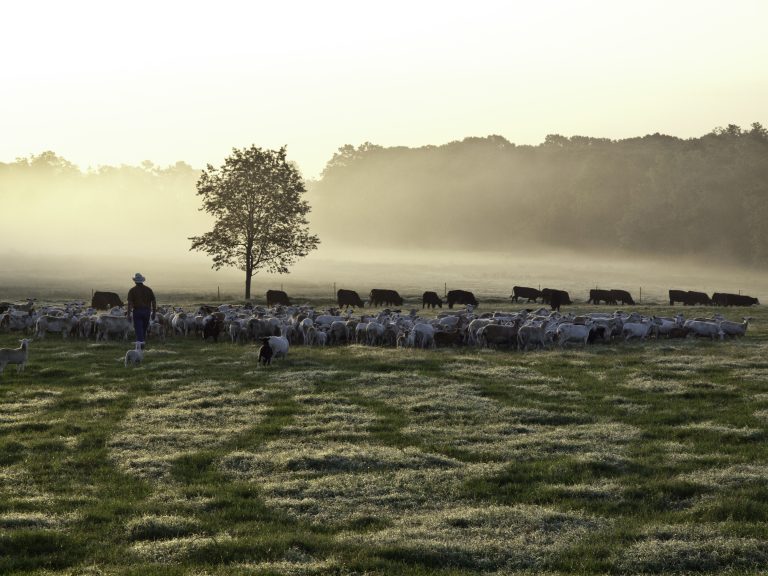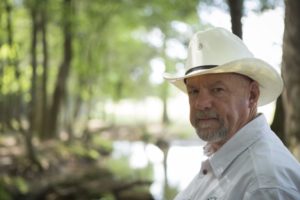Western Ag Reporter: Regenerative Agriculture Counters Fake Meat
Published September 19, 2019 | by Kerry Hoffschneider
You may have seen Will Harris, agriculturist and livestock steward, from Bluffton, Georgia on a recent episode of CNN’s Vital Signs where he confronted Dr. Pat O’Reilly Brown, Impossible Foods founder in a dialogue about “fake meat” vs. beef raised out on the land. Harris is the visionary behind the most recent agricultural pursuits at White Oak Pastures.
“Certainly, the plant-based protein business has exploded,” Harris said. “People have the right to eat whatever they want to eat. However, I do resent and will not tolerate people who say they are eating it because cattle are destroying the environment. Dr. Brown stepped over the line when he stated that raising livestock regeneratively is horrible for the environment.”
While the meat debate may be the hot topic of the day, Harris decided long ago to not tell others, but show them there is a better way for livestock, people and crops on his farm and ranch. Harris is the fourth generation to reside at White Oak Pastures and is the descendant of Captain James Edward Harris (Calvary – CSA) who founded their family farm after the Civil War.
Today, Harris, his wife Yvonne, and their children – Jody and her husband John Benoit; Jenni and her partner Amber Harris; and Jessica Harris Miller – along with their grandchildren have all been and will continue to be involved with the most recent transformation on the farm that Harris calls, “A bold return to giving a damn.”
What does this, “giving a damn” mean?
“Beginning around 1945, with the Post World War II Agricultural Revolution, the Will Bell Harris generation commoditized, centralized and industrialized American farm production,” Harris explained.
Will Bell Harris was Harris’ father and while he said these changes in agriculture were done for “noble” reasons that made food, “cheap, abundant and ‘safe,’” what really happened was a fall-out that is still being faced across the nation. Harris outlined this fall-out, stating that commoditization led to what he calls, “minimum standards” that were set for farm commodities such as corn and peanuts.
“Farmers were no longer incentivized to make their production the best that it could be,” Harris said. “Market price was paid for products as long as it met the minimum standard. Farmers would go broke if they put increased quality into a product, because they could never extract this added value from the marketplace.”
Harris said much of the industry was centralized as both production and processing operations moved to specific geographic regions. Vegetables moved to California, corn and soy to the Midwest, cotton and peanuts to the south and cattle feeding to the west, Harris said.
“This dried up and debilitated small, family-owned, hometown processing throughout rural America because larger factory farms could process more cost effectively,” he said. “Shirts were made in the shirt factory, so pigs were made in the pig factory. Catering labor, equipment and other processing necessities to a few specific functions, cost was further driven down. Unfortunately, this change ignored the complexities of the living animal system. These changes had horrific, unintended consequences on the welfare of our farm animals, the degradation of our natural resources and the economy of rural America.”
In 1995, Harris made the conscious decision to return to a production system that “de-commoditized” the industrial agriculture path their farm had been on for a short time. De-commoditizing for Harris meant the start of production of five pasture red meat proteins, five pastured poultry proteins, pastured eggs and certified organic vegetables. Today, all those products are sold under the “White Oaks Pastures” label.
“We also de-industrialized and do not operate our farm as a monocultural factory. We operate it as a living ecosystem,” Harris said about their 3,200-acre primarily livestock farm. “Ten species of humanely-treated animals live in symbiotic relationships with each other. Our lands are holistically managed to become increasingly a living, organic medium that is teeming with life.”
They also “de-centralized” he explained. The production system at White Oaks Pastures is vertically integrated and all processing abattoirs are on-location. Harris built two United States Department of Agriculture (USDA) – inspected slaughter facilities. The investment of $7 million in these facilities over a five-year period was made by Harris alone.
This gave the brand more control of their quality. Becoming vertically integrated created a need for more employees and today, they employ 165 people and are the “largest, privately-owned employer in the county with a payroll of $100,000 per week,” Harris said.
Harris is dedicated to maximizing everything they are doing at White Oak Pastures – from trying to operate at zero waste to serving three square meals a day, seven-days-a-week at their restaurant. They also ship products all over the country and have several thousand people visit their location every year. Some of these visitors travel across the nation and globe to stay in pre-booked cabins and others simply come for a tour and to pick up their favorite products – everything from leather purses made in their leather shop to pet treats.
“My vision is to continue evolving this production system,” Harris said. “I feel like we have done most of the heavy lifting in creating it and it will continue to evolve as time goes on. What we do here is not highly scalable as we may be approaching the top limits of the scale that we should probably operate at. However, it is highly replicable. There could be one or more White Oak Pastures in every agricultural county in all 50 states. That is why we operate with full transparency for anyone who wants to come here and see what we do and anyone who wants to emulate what we do is welcome to do just that.”
“I’m glad I made the decision to get out of the industrial, commodity, centralized meat production business and move into the regenerative, local production model,” Harris said with confidence. “It has brought a lot of prosperity to the community and allowed my children to come back. I still like to see people move in this direction. But, as big, multinational firms have learned how to ‘greenwash’ their products and the USDA has allowed beef to be brought into this country under grass-fed, USA labels when many of these cattle were actually born and raised in countries like Uruguay or Australia, it does make it more difficult to compete. Still, I hope that people will work against all of that and continue to change.”
Learn more about White Oak Pastures and Will Harris at www.whiteoakpastures.com or like “White Oak Pastures” on Facebook.

